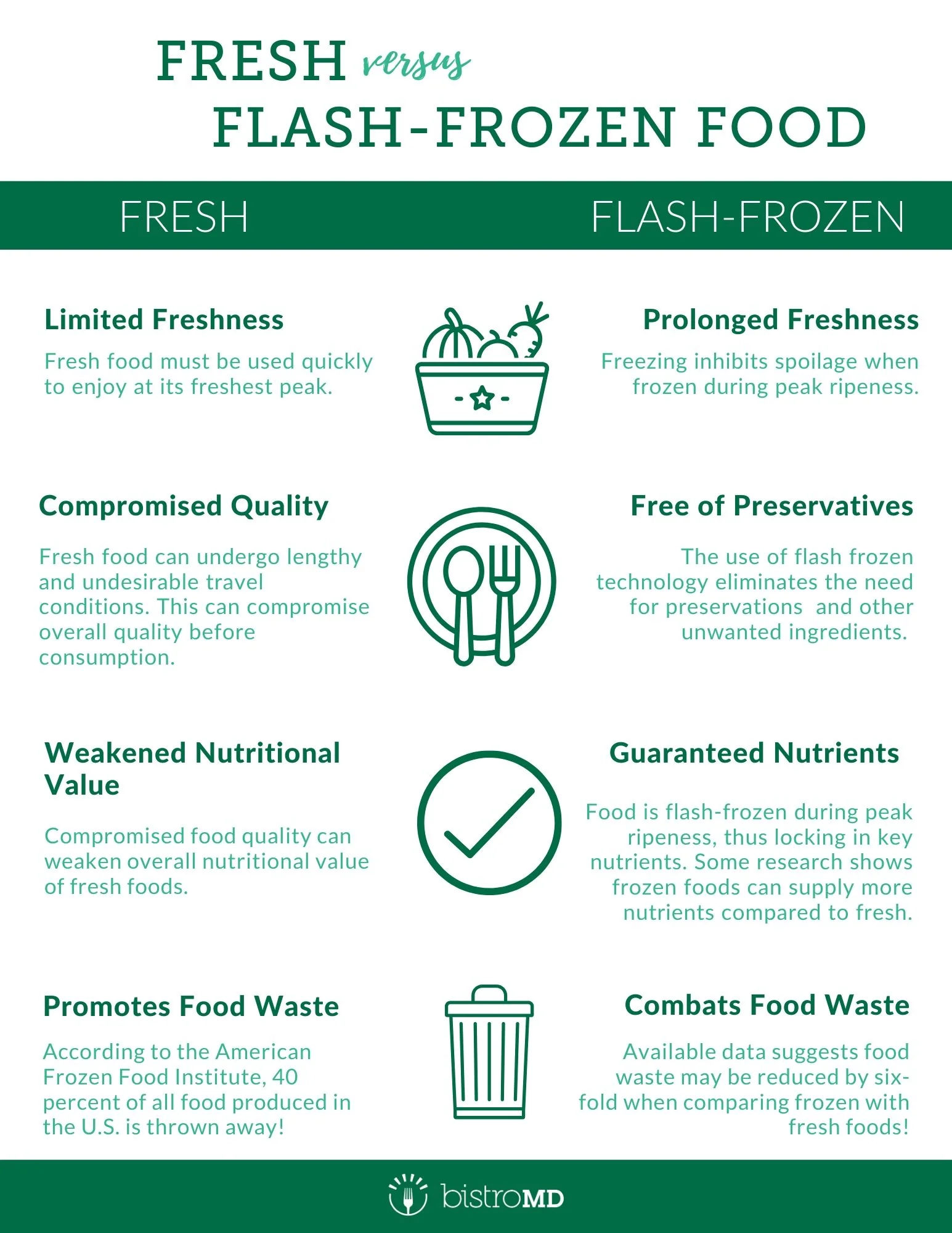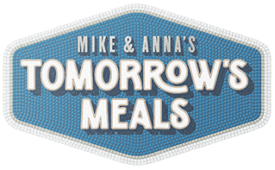
The Ins and Outs of Frozen Foods
Skeptical of frozen food? Not anymore! We debunk common frozen food myths, explore their cool benefits, and just how to safely build them into a healthy diet.
Article from – The Ins and Outs of Frozen Foods | BistroMD
Frozen food is not a new concept. But it is not always welcomed by consumers and health enthusiasts alike.
However, frozen foods and meals are much more than box dinners presumed to be. In fact, they can even be advantageous to health, as well as to the economy.
We explore what frozen food actually entails while naturally debunking common misconceptions and highlighting their benefits.
After clearing the air, learn how to properly store and select the healthiest frozen food as well!
Frozen Food
Simply stated, frozen food is food that has undergone freezing and is kept frozen and preserved until used. The freezing process slows down decomposition by turning excess moisture into ice and inhibiting bacterial growth.
Freezing is a common practice throughout households and the food industry. Freezing tends to be slower at home, while the food industry tends to use quick processes such as flash freezing.
Despite such advances in freezing technology, people tend to misconstrue the nature of frozen foods.
Misconceptions About Frozen Food
Many misconceptions surround frozen foods and give them a negative rep. Can you decipher fact from fiction when it comes to frozen versus fresh food?
Claim #1: Frozen vegetables are less nutritious than fresh veggies.
False.
Consumers often presume fresh foods, especially produce, is the healthy choice. But there is ongoing research that helps debunk this frozen food myth.
A study compared nutrient status of vitamin C, provitamin A, and folate in fresh, frozen, and fresh-stored produce. “Fresh-stored” produce mimicked typical consumer storage following purchase, or five days of refrigeration.
Frozen produce outperformed “fresh-stored” more than “fresh-stored” outperformed frozen. The results suggest frozen produce is more nutritious than its 5-day, fresh-stored counterpart in some situations.
Another study found overall vitamin content of frozen commodities was comparable to and occasionally higher than that of their fresh counterparts.
Claim #2: Frozen food is not as fresh as fresh food.
False.
“Fresh” food may be suggestive, but frozen should not be instantly synonymous with unfresh.
Fresh produce naturally ripens throughout transportation, which causes them to lose moisture, become susceptible to spoilage, and decline in nutritional value.
Likewise if considering the stages of seafood, from being caught in remote locations of the ocean to being sold at the market, it is slowly spoiling.
When frozen, on the other hand, produce is harvested at its most ripe stage and quickly frozen to preserve its freshness and nutritional value. Seafood is also frozen within hours of being caught, preserving its flavor and nutritional value until prepared.
Claim #3: Frozen meals can be environmentally-friendly.
True.
Frozen food can actually lessen the amount of spoiled food that is thrown away. It can be divided into the correct portion sizes, including single servings, and can last much longer than a few days.
Food manufacturers often use environmentally safe packages to transport meals.
Claim #4: All frozen foods contain unwanted ingredients and preservatives.
False.
You might be imagining frozen food loaded with added sugar, saturated fat, sodium, and other unnecessary additives.
While some frozen foods do contain unwanted ingredients, just like unfrozen foods, others are prepared and packaged in their most natural form.
Since these foods often use flash-frozen technology, the need for preservations is eliminated.
Benefits of Frozen Foods
There are so many advantages of frozen foods, including their convenience and freshness. Frozen foods can cut down on food waste and grocery costs, too.
- Frozen food offers convenience.
Frozen meals are convenient and a timesaver from grocery shopping, meal prep, and kitchen cleanup.
Frozen food comes in many time-saving varieties, including peeled and cut vegetables, trimmed meat, and steamable and microwavable pouches.
All-in-all, minimal effort is required for frozen food preparation. Consumers also gain more time to donate to other tasks, responsibilities, and pleasures thanks to frozen meals.
- Frozen food ensures freshness.
Frozen food may even be the freshest! Freezing foods essentially inhibits spoilage when frozen during their peak ripeness.
Produce, especially, is flash-frozen within just a few short hours following harvest. This locks in key vitamins and minerals whilst preserving taste.
This process of freezing locks in sensitive nutrients for an extended amount of time.

- Frozen food is healthy and nutritious.
Thanks to freezing technology, frozen foods are not only healthful but may even be more nutrient-rich than fresh products.
As mentioned, produce is generally flash-frozen during peak ripeness, thus locking in and withholding their nutritional content.
The principle holds true when frozen foods are compared to fresh produce that may lose their nutritional quality during prolonged transportation and storage at grocery stores.
- Frozen dinners and foods offer meal flexibility.
Meal flexibility helps reduce the risk of flavor burnout, which may ultimately resort to less healthful habits and decisions.
Having nutritious, frozen foods ready for use not only lessens the risk of continuous evenings out for dinners but helps individuals adhere to health goals.
- Enjoy favorite frozen meals and foods year-round.
Frozen foods have a much longer shelf-life than its refrigerated relative.
Preserving foods allows individuals to enjoy foods that may not be in season throughout all times of the year. This especially serves true for seasonal fruits, veggies, and fresh-caught fish.
- Purchasing frozen foods can be budget-friendly.
“Eating healthy is too expensive” is a common misconception or excuse when it comes to choosing more nutritious foods over convenience products.
Although choosing organic sources may take a harder beating on the wallet, frozen foods can ambiguously be waist and budget-friendly.
Preserving foods also lessens the risk of throwing both food and money away.
- Frozen foods help reduce and eliminate food waste.
According to the American Frozen Food Institute, 40 percent of all food produced in the U.S. is thrown away! This equates to nearly $162 billion worth of food waste each year, and that is just in America!
Frozen food may be a solution to combat food waste, hunger, and ensure overall food security. Some data suggests food waste may be reduced by six-fold when comparing frozen with fresh foods!
Best Healthy Frozen Food
To maximize these benefits, it is important to understand how to choose healthy frozen foods. But with so many choices available, ensuring healthy frozen food is not as simple as limiting ice cream, pizza, what have you.
Navigate the freezer aisle with ease by implementing these simple strategies. Also take advantage of healthy frozen meals delivered directly to you.


